Sen. Hawley grills acting Secret Service director: 'Trying to find someone who's accountable here'
Sen. Josh Hawley, R-Mo., grilled Acting Secret Service Director Ronald Rowe about the details of the Trump assassination attempt in Butler, Pennsylvania.
The U.S. Secret Service (USSS) is facing heightened scrutiny in the wake of the July 13 assassination attempt on former President Trump, with the shooting raising questions about the agency's culture and staffing.
Current and former USSS employees have voiced concerns about the agency being plagued by understaffing even as its budget has increased to $3 billion. USSS leaders are being grilled not only on the failures on July 13 in Butler, Pennsylvania, but also on their handling of their team's morale and their ability to recruit and retain talent.
"The team I was once proud to be a part of is something I have to now somehow hide as I move into my next career," a USSS counter sniper reportedly wrote in an internal email last week, part of which was read by Sen. Marsha Blackburn, R-Tenn., during a congressional hearing on the assassination attempt. "Who wants to hire a USSS [counter sniper] who failed? That's the public perception I'm now faced with."
The counter sniper said the agency's motto is "CYA," or "cover your a--," and that "every supervisor is doing it right now."
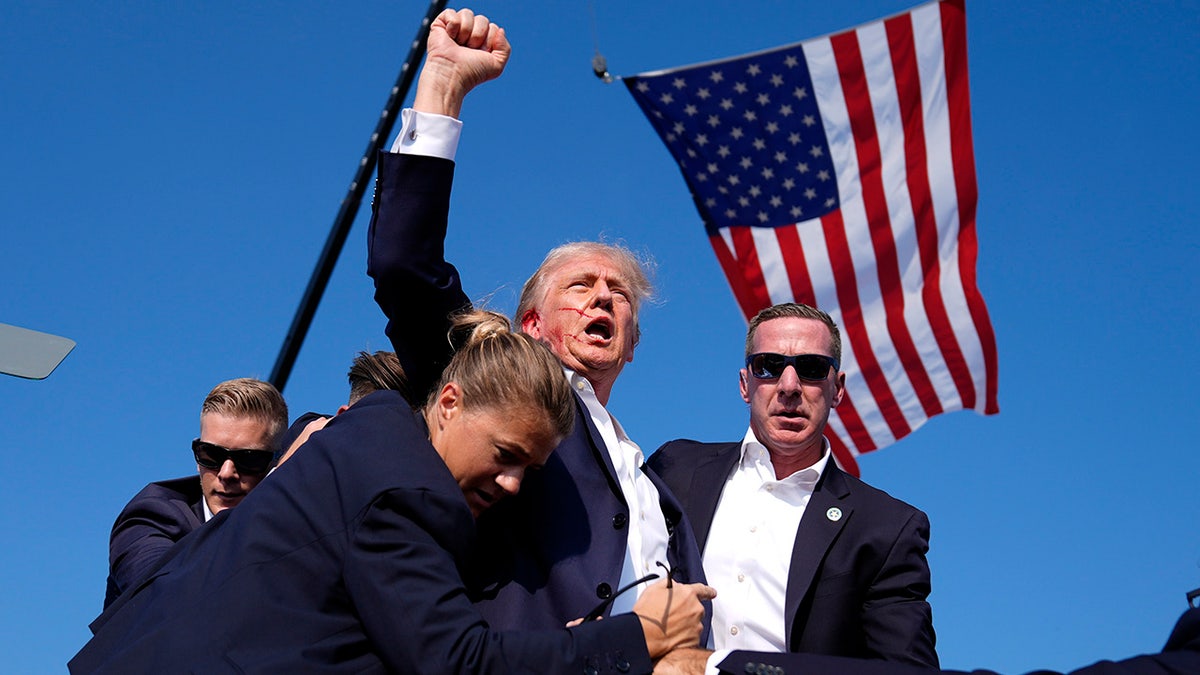
Former President Trump is surrounded by Secret Service agents after shots were fired at a campaign rally, July 13, 2024, in Butler, Pennsylvania. (AP Photo/Evan Vucci)
"The USSS CS team is a stain I will never be able to cleanse," the counter sniper wrote in the email, which was obtained by Real Clear Politics reporter Susan Crabtree. "We failed. Not because of commitment or sense of dedication. But because our supervisors knew better and thought our concerns were less than important."
"The public has lost trust in the ability to execute the mission to protect, and I want to know how you feel about the fact that employees in your agency are worried about covering their behind and not worried about protecting a former president," Blackburn told acting USSS Director Ronald Rowe Jr. at a hearing before the Senate Judiciary Committee last Tuesday.
Rowe Jr. said he was "hurt" by his employee's words.
"I'm hurt because my people are hurting right now," he said. "We need them."
Rowe, whose agency was also hit last week with allegations of retaliation, said that "emotions are raw" within the USSS right now and that he wants to "hear more" from the counter sniper who wrote the email, describing himself as a Marine as well as a 20-year veteran with the USSS. Rowe added that he is committed to reviewing things and being a "change agent."
Secret Service by the numbers
Total USSS staffing rose to 7,811 in 2021 before dropping the last two years, with 7,689 employees in 2023, according to Congressional Research Service figures.
That includes approximately 3,200 agents, 1,300 uniformed division officers and more than 2,000 support personnel, according to the agency's website.
"Quality of life," Charles Marino, who spent 18 years as a Secret Service agent, told Fox News Digital about why agents are leaving the USSS.
Rowe hinted last week at the challenging lifestyle that agents face.
TRUMP ASSASSINATION ATTEMPT PUTS SECRET SERVICE FUNDING IN QUESTION: AMERICANS 'DESERVE ANSWERS'
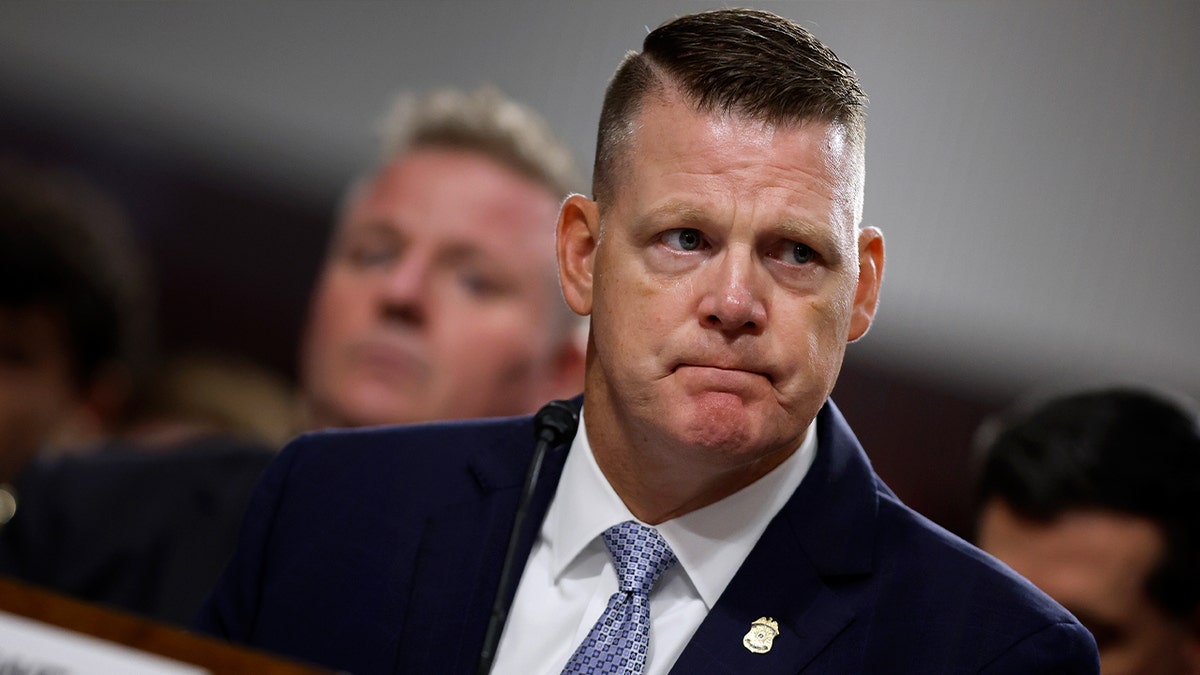
Secret Service Director Ronald Rowe Jr. testifies at a Senate Judiciary Committee hearing on the security failures leading to the July 13 attempted assassination of former President Trump at the U.S. Capitol, on July 30, 2024. (Chip Somodevilla/Getty Images)
"One of the most difficult aspects of the mission is the extensive travel our people are subject to throughout the year," he said. "This is particularly true in presidential campaign years as protectees traverse the country, often conducting multiple protective visits in a single day."
Recruits accepted into the USSS ranks must sign mobility agreements stating their willingness to accept assignments anywhere in the U.S. and overseas, according to the agency's website – however, Marino told Fox News Digital that "of course, [your] family moves with you."
SECRET SERVICE CHIEF PRESSED ON STAFFING LEVELS, PERSONNEL TURNOVER DESPITE BUDGET GROWTH
What does it take to be a Secret Service agent?
Although veterans are preferred, prospective USSS agents don't need any experience in law enforcement. During his 18 years with the agency, recruits needed a college degree and five years experience in any job, Marino said.
But according to the agency's website, which touts its "Zero-Fail Mission," it is now possible to start training for the USSS straight out of college.
Candidates must be at least 21 when they apply and no older than 37 by the time they receive their offer of employment. Recruits with prior military experience are eligible until they are 40 years old.
"You're looking for, you need a clean background, you've got to be able to pass a polygraph," Marino, who protected Bill Clinton and Barack Obama, said of what the agency looks for in recruits. "You're looking for people that played a college sport, are athletic, you're looking for people that are in shape, you're looking for people that are going to be flexible, are thinkers – you want the total package."
ACTING SECRET SERVICE DIRECTOR TELLS SENATE TRUMP SHOOTING WAS 'A FAILURE OF THE SECRET SERVICE'
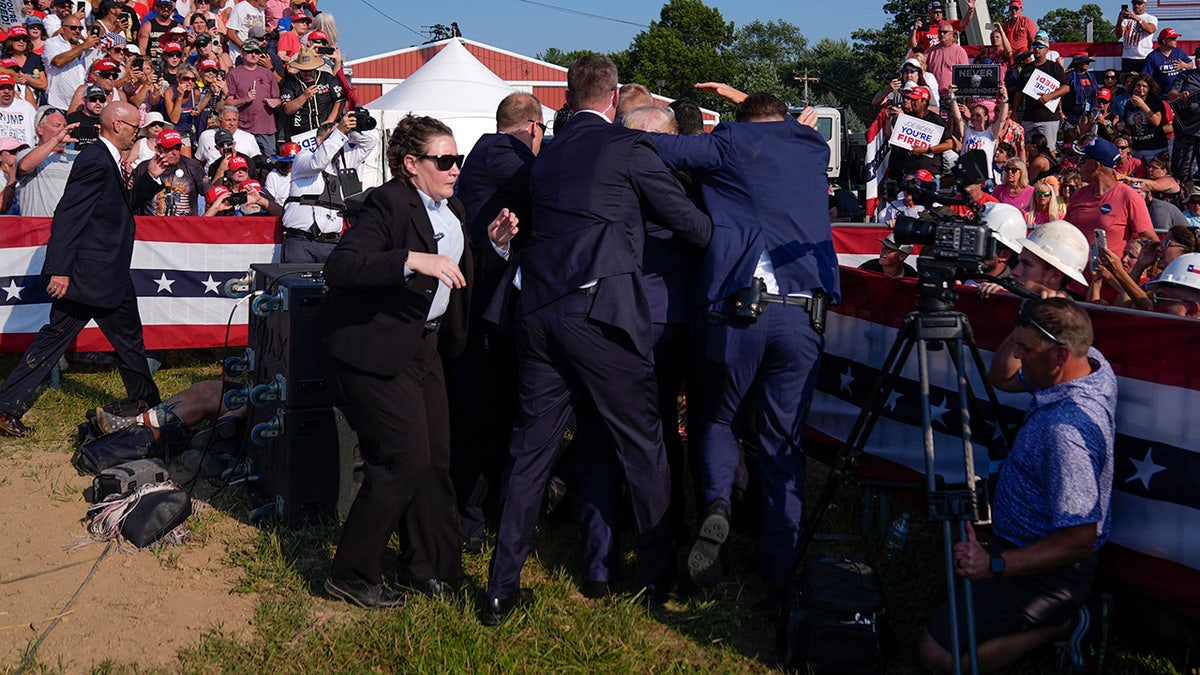
Former President Trump is surrounded by Secret Service agents at a campaign rally, July 13, 2024, in Butler, Pennsylvania. (AP Photo/Evan Vucci)
Prospective recruits must pass a visual and hearing exam – their uncorrected vision can be no worse than 20/100 and must be 20/20 when corrected, while hearing loss cannot exceed 25 decibels.
They cannot have any visible tattoos, save an unobtrusive tattooed wedding band on one finger – accepted applicants with the agency must have their tattoos medically removed before starting duty, according to the agency.
In addition to a background check, driving record check and drug screening, prospective agents must pass medical and polygraph examinations.
Background checks are extensive and take between six and nine months, according to the agency, and include interviews with friends, neighbors and family.
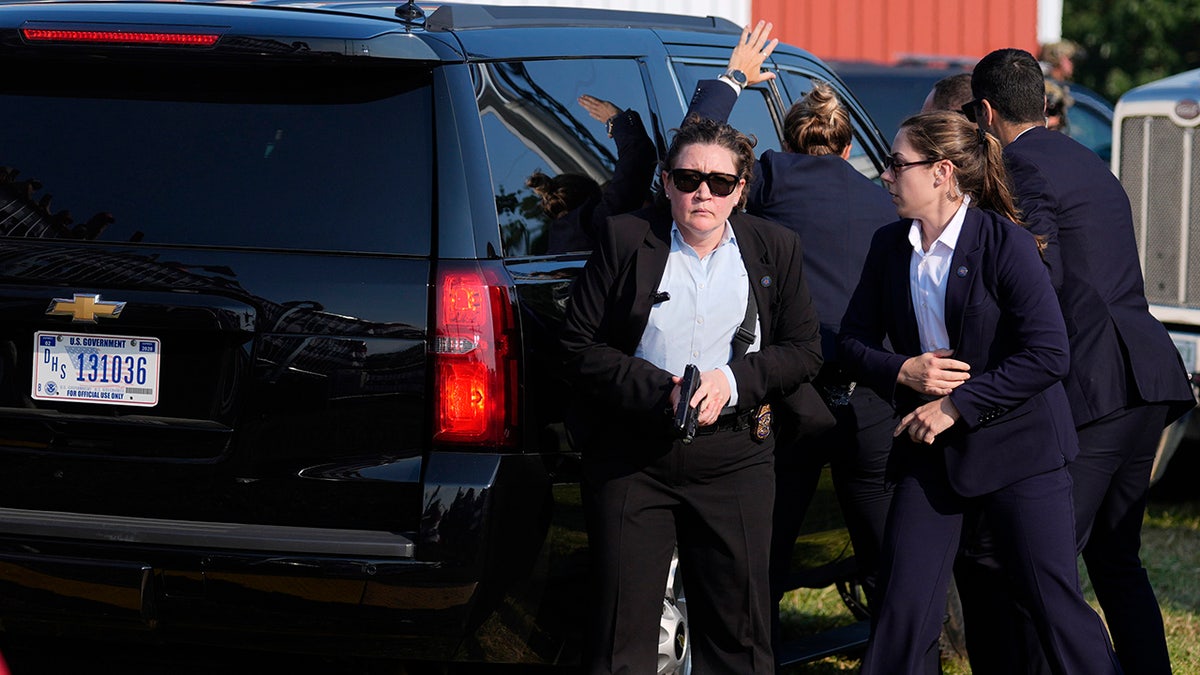
Former President Trump is secured inside a vehicle after shots were fired, July 13, 2024, in Butler, Pennsylvania. (AP Photo/Evan Vucci)
Annual salaries for agents start at $49,508, according to the agency's website. Prospective hires who have completed a relevant master's degree, Ph.D. or relevant field experience can be hired at a higher level and salary.
Before they begin training, agents must pass the Special Agent Entrance Exam, which has sections for logic-based reasoning, grammar and detail observation through photos. They also need to undergo interviews with the agency's hiring panel.
Before they are given their first assignment, according to Marino and the agency, accepted USSS agents go through about eight months of training.
First, they complete a Criminal Investigator Training Program at the Federal Law Enforcement Training Center in Flynco, Georgia. Then, agents spend about 18 weeks at the U.S. Secret Service James J. Rowley Training Center outside Washington, D.C., in Laurel, Maryland.
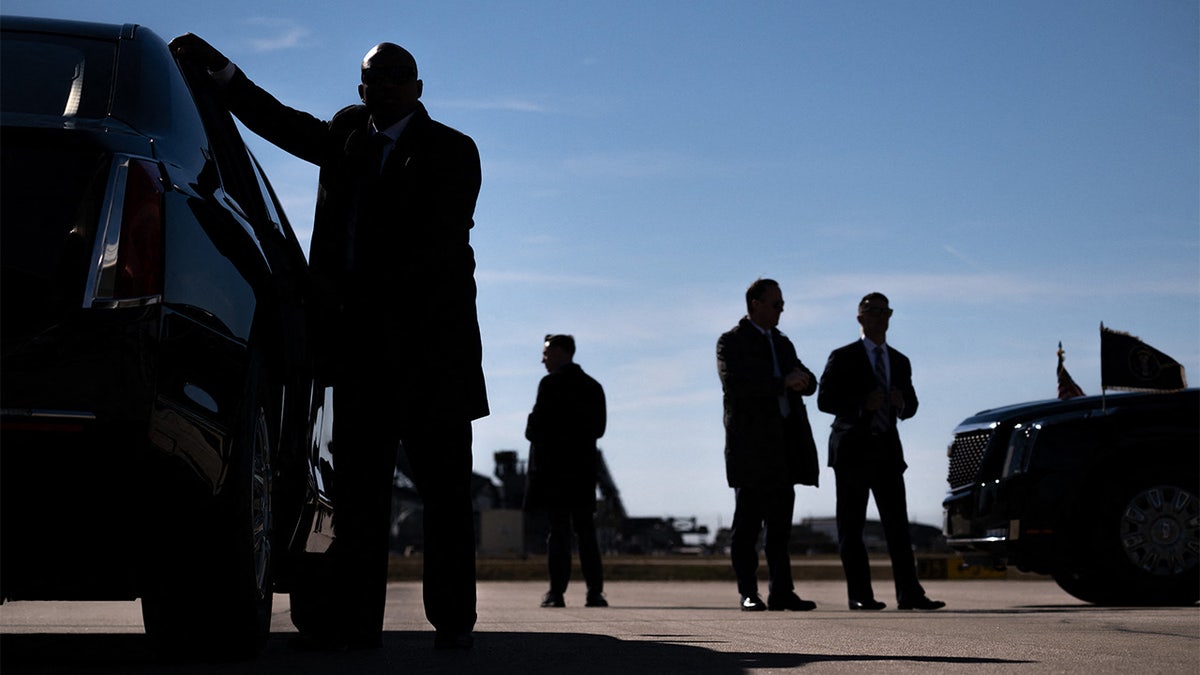
Members of the Secret Service stand by the presidential limousines as President Biden disembarks from Air Force One upon arrival at Raleigh-Durham International Airport in Morrisville, North Carolina, on Jan. 18, 2024. (Saul Loeb/AFP via Getty Images)
After finishing the extensive training, Marino said agents are first assigned to a field office.
"You get assigned to a field office, so you go through some period of field training, actually being in your assigned field office and start working for lower-level dignitaries, financial crimes," he said. "Back when I was there, you did five to six years in your first field office before you were ever considered going to a protection detail or a former protection detail – I think that time has decreased significantly."

Secret Service uniformed officers carry a child who crawled through the White House fence on Pennsylvania Avenue in Washington, April 18, 2023. (AP Photo/Nancy Benac)
CLICK HERE TO GET THE FOX NEWS APP
Agents on a protection detail with a high-level protectee – like the former president – should complete two-week-long refresher training sessions every six weeks, Marino said.
"This is where the resources come up," Marino said. "These kids just are not getting the chance to train the way they need to – with the resource crunch, especially during the campaign, I highly doubt that's happening."












































